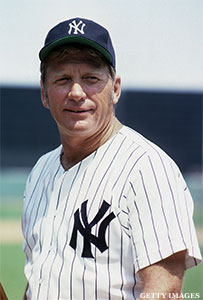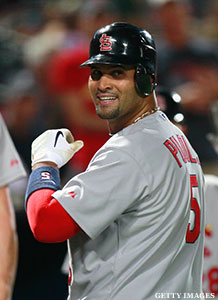
When baseball salaries boomed in the decades following his playing career, Mickey Mantle often quipped, “If I was playing today, the first thing I’d say to the owner in the morning would be, ‘Hello, partner.’”
That one-liner became part of The Mick’s regular repertoire in his post-career celebrity days, a half-jab at the old guard, new economics and a comical reframing of the past. Ballplayers played only for the love of the game? Be serious.

It was a wishful thought for Mantle, who played for the George Weiss Yankee regime, an engine that considered World Series bonus money part of a regular wage and believed agents, multi-year contracts and player rights were best left to a country ballplayer’s imagination.
Now here is Albert Pujols and the monster contract that could reshape the baseball economic landscape for the next decade. Most telling is the rumor that the Cardinals were supposedly willing to offer an equity share in ownership of the club -- Mantle’s Holy Grail.
“We explored a number of different things,” Cardinals chairman William DeWitt Jr. said. “There was discussion about other things that could be part of the contract. You can be sure we explored a number of different avenues.”
You can be sure that a meaningful stake of club ownership will not be on the table. Perhaps Pujols will be offered a ceremonial nibble in the form of a post-career personal services contract -- but not a piece of the real action.
The idea that a star hitter, even a generational talent, will somehow be allowed into the fraternity of baseball ownership as part of his reward for what he achieved on the field is every bit as buzzed as The Mick’s zinger. Nolan Ryan is not in ownership because of 5,000 strikeouts. He is there because he knows 5,000 people, and a lot of them are Texas rancher barons and oil billionaires.
The DeWitt family is rooted in generations-old baseball blood, dating back to the dirt cheap St. Louis Browns and influenced by Branch Rickey, who believed any player was expendable if you adhered to quantity over quality. This is one of the most powerful families in baseball, rooted as deeply in player control as Yankee general manager Weiss and club president Dan Topping were in Mantle’s day.
Behind closed doors in today’s professional baseball, the Cardinals are known for being stubborn. Firmly entrenched in financial conservatism, even their big money deals build in as much caution as they can. When the Cardinals re-signed Matt Holliday at seven years and $120 million last June, the $17 million per season price tag looked slightly more reasonable compared to the $18 million per season average and $126 million the Nationals gave Jayson Werth this winter. Carl Crawford’s seven-year $142 million deal with the Red Sox deal will peak at $21 million in 2017. The Cardinals will have to likely beat both deals to keep Pujols around. Offer labor a piece of management to improve short-term cash flow? Not a chance.
“Me and my agent talk every other day about you guys throwing numbers out, assuming the Cardinals offered me this,” Pujols said. “Albert asking for 10 years. We just laugh about it and I’m pretty sure the Cardinals are, too. You guys don’t have any clue.”

Few modern fans have a clue about the historical roots of the DeWitt family or the historical negotiating patterns of the Cardinals dating back to the 1930 Gas House Gang. As for Pujols, his logic misses one vital point: No matter what they spend, the Cardinals have long been among the most pro-management organizations in baseball. Pujols, like Mantle, is labor. Swing a hammer or swing a bat, a grunt is a grunt to billionaires.
“I just don’t like the idea of dealing with agents,” Cardinals general manager Fred Saigh said in 1950, and you can be sure, DeWitt Jr. is thinking the same thing privately today.
If Pujols is worth better than $200 million, what would Cardinals icon Stan Musial be worth today?
Nearly 60 years ago, Musial earned a cool $50,000 in 1952. He was the highest paid Cardinal, but he was the second-highest paid player in the National League behind Pirates slugger Ralph Kiner. Since Albert says we all have no clue, I’m sure he has this information in the trunk of one his Hummers.
Here were the top paid players in baseball, according to an Associated Press story dated March 2, 1952:
Ted Williams, LF – Boston Red Sox - $125,000
Joe DiMaggio, CF – New York Yankees - $100,000
Ralph Kiner, OF – Pittsburgh Pirates - $65,000
Lou Boudreau, SS – Cleveland Indians - $65,000
Hal Newhouser, RHP – Detroit Tigers - $50,000
Stan Musial, 1B-OF – St. Louis Cardinals - $50,000
Bob Feller, RHP – Cleveland Indians - $45,000
Tommy Henrich, OF – New York Yankees - $45,000
George Kell, 3B – Detroit Tigers - $35,000
Jackie Robinson, 3B – Brooklyn Dodgers - $35,000
Pee-Wee Reese, SS – Brooklyn Dodgers - $35,000
Phil Rizzuto, SS – New York Yankees - $32,000
Bobby Doerr, 2B – Boston Red Sox - $30,000
Dom DiMaggio, CF – Boston Red Sox - $27,000
Johnny Mize, 1B-OF – New York Yankees - $27,000
Luke Appling, SS – Chicago White Sox - $25,000
Del Ennis, LF – Philadelphia Phillies - $25,000
Johnny Sain, RHP – Boston Braves - $25,000
Enos Slaughter, OF – St. Louis Cardinals - $25,000
Vern Stephens, 3B-SS – Boston Red Sox - $25,000
Allie Reynolds, RHP – New York Yankees - $25,000
A-Rod could buy this roster at those rates. Easily.
You could argue that some of these players were as meaningful and influential to their franchises as Pujols is to his and thus worthy of ownership stake consideration. They’re still waiting, just like A-Rod.
Baseball owners are not in the business of giving every employee of the month a share of the business.
There’s a lot of fun to infer here in comparison to the modern game. Indians fans would love their team to have two of the top seven highest paid players in the game, just as modern Pirates fans might have to struggle with the notion that their team once had the highest paid player in the National League.
But the two top-paid players, Williams and DiMaggio, belonged to the Red Sox and Yankees, respectively, who combined for nine of the top 21 spots. Some things never change.
If I know my history, I’m sure William DeWitt Jr.’s old man would say, “See! We told ya so! Keep 'em cheap and hungry and there’s more talent to spread around.”
You can be sure of one thing. Musial would never be invited to ownership. Neither would have been Mantle, who made $7,500 in his second year.
Nor will Pujols, who will be lushly rewarded with cash, but his power will never be rewarded with power.
-- John Klima is the author of "Willie’s Boys: The 1948 Birmingham Black Barons, The Last Negro League World Series, and the Making of a Baseball Legend."




